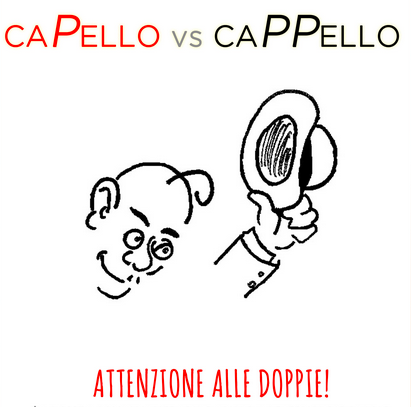
Growing up, I learned how my language is considered difficult, incomprehensible but also fun. And there are many foreign people who told me "Francesco, how do you expect me to understand Italian?". I don't blame anyone: it's really hard! Tenses, articles, prepositions, declinations ... For this reason I decided to play down a little. Speaking instead of the really crazy differences between English and Italian. Day by day, i'll explain the mejor difficulties of italian. I hope you enjoy it!
Rule number one: pay attention to double consonants! The English-speaking countries are already sweating cold, I know: consonants should be an instrument to make a word more musical, not to make it more difficult. Yet the land of the mandolin has no soft and flowing consonants like the double "l" in English. Here the consonants are essential for both number and use, as a single pronunciation error can lead to make the whole sentence incomprehensible. The craziest example that comes to mind is the word "year", in Italian translated into "anno". Well, just pronounce the "n" softer, to turn it into "asshole". I'm not joking, I swear! "anno" and "ano" are so similar words, but so different in meaning and pronunciation in Italian.
Do you want another example of how complicated we are? Well, take the word "shovels", translated into "pale". Add a second "l" in the pronunciation, and it will turn into testicles! This is indeed the meaning of "palle".
In addition, to distinguish between doubles and singles, it's important to have a good ear, emphasize the consonants to facilitate the acquisition and learning of these seemingly simple but complex terms. The practice can also be done with music; an excellent exercise is to practice double consonants by singing or reciting nursery rhymes with a rhythm at will. Do you want an example?
la casa (house) non è cassa (cash desk)
la sera (evening) non è serra (greenhouse)
la rena (sand) non è renna (reindeer)
la sete (thirst) non è sette (seven)
il caro (dear...) non è carro (wagon, chariot)
il nono (ninth) non è nonno (granpa)
e il capello (hair) non è cappello (hat)

Of course, every country has its pronunciation problems. Imagine how long it took me not to say "beach" and "bitch" in the same way! I would have certainly made a bad impression in London. But this is the beauty of languages: it is not just about grammar. A language should be experienced both on a piece of paper and with a voice. So remember: train the pronunciation of hard consonants, if you do not want to insult someone!
hello @meowlow and welcome to steemit!
this is a great place with a great community .. glad to have you.
@ricmark
<a href="jj".>WELCOME TO STEEMIT
I appreciate if you follow me,
Your comments are always welcome,
I will try to answer as much as possible,
Good luck with your trip in this communitas,
the best combination with all your friends is no exception,and upvote to your friends as much as possible,and the reverse.
follow me @elbow
regards community steemit
thank you